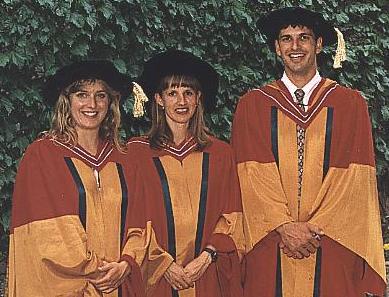
Watershed Ecosystems grants first PhDs
This year's convocation was particularly significant for the Watershed
Ecosystems Graduate Program (WEGP), with degrees conferred on the program's
first three PhD graduates. Prior to this year's convocation, the university
has conferred only one PhD in Biology in 1968. WEGP is currently the only
program offering a PhD at Trent.
Paul Healy, dean of research and
graduate studies, feels that it's
important to stress the significance of this event in Trent's history. "The
establishment of PhD programs and the conferring of doctoral degrees is the
pinnacle of academic endeavor and achievement for a university. It's been a
very long process to get us here," says Healy, noting that discussions
leading to the establishment of the Watershed Ecosystems PhD program began
about a decade ago. "It's taken a lot of effort on the part of many faculty
and other members of the Trent community."
"That Trent is able to present PhDs in
this discipline says a great
deal about the quality of the program and about Trent's reputation in this
field."
Receiving the first PhDs in Watershed
Ecosystems were Dawn Burke,
Karen Smokorowski and David Woodfine.
Burke, 29, who is also the winner of
the Governor General's Gold
Medal for the highest academic standing in a graduate program, completed a
Bachelor's degree in zoology from the University of Western Ontario. She
came to Trent in 1994 as a Master's student and quickly qualified to move
into the PhD program. Her dissertation research focused on the reproductive
success of forest breeding birds in relation to disturbances of forest
habitats. Burke says that her research, which was geographically focused in
the Peterborough area, indicates that the size of a forest can have a
significant impact upon the reproductive success of the birds that breed
within that area.
At the time of convocation Burke was
within weeks of giving birth
to her first child. She is hoping to continue to do research in landscape
ecology, possibly through post-doctoral work at Carleton University.
Smokorowski, 29, did her undergraduate
work at the University of
Toronto, graduating in 1993. She decided to pursue graduate studies at
Trent because of the reputation of the program and the faculty associated
with it.
"I chose Trent largely because of the
holistic approach of the
Watershed Ecosystems program, and I had heard nothing but good things about
[professor] David Lasenby." Her research involved studying the response of
the freshwater shrimp Mysis relicta to the fertilization of Kootenay Lake
in British Columbia.
While she was still working on
revisions to her thesis, Smokorowski
was contracted by the Department of Fisheries and Oceans, Great Lakes
Laboratory for Fisheries and Aquatic Sciences (DFO GLLFAS) in Burlington,
to write a report outlining the response of the fish community in Hamilton
Harbour to the Hamilton Harbour Remedial Action Plan, an extensive
rehabilitation effort undertaken over the past eight years. That work has
led to a three-year contract as a research scientist (a position for which
a PhD is required) with the Sault Ste. Marie branch of the DFO GLLFAS.
Smokorowski began that job in March and is in charge of a new series of
experiments involving whole lake manipulation of fish habitat.
David Woodfine, 29, completed a general
B.Sc. in biology at the
University of Western Ontario, but came to Trent for his honors year
specifically because of the Watershed Ecosystems program.
"I had begun to look for graduate
programs, and I had already taken
all the aquatic courses offered at Western by the end of my third year.
People told me that if that's what I was interested in, Trent was the place
to be."
Woodfine entered the Watershed
Ecosystems master's program, and became
the first student to move into the PhD program when it was established. His
research focused on the recovery of acidified lakes in the Sudbury region.
Woodfine taught a number of courses in
biology and environmental
science during his time at Trent, and is currently seeking a teaching
position at a university in Canada or the United States.
|

Maintained by the Communications Department
Last updated: June 11, 1998
